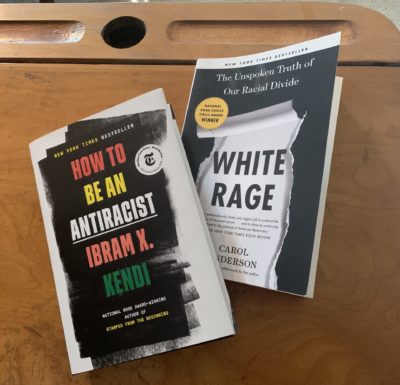American cities are burning. We may not have started the fire – a blaze whose embers have been glowing for over four hundred years, bursting forth occasionally in outbreaks of rage and pain and awfull judgment – but we had damn well better find a way to put it out.

Recommended reading: Ibram Kendi, *How to Be an Anti-Racist*; Carol Anderson, *White Rage*
I have seen many historians this week reference the antecedent of the “Long Hot Summer” – it seems like we’ve had several of those in recent years, a manifestation of cultural climate change that may bring disastrous consequences. I’ve seen discussions online about how the electoral politics of 2020 may come to mirror the politics of 1968, or 1972 – “law and order,” “the silent majority,” hardhat rioters replaced this time with militia members brandishing long guns in state capitols, George Wallace running not as a third-party candidate but as the incumbent. The past cannot predict the future. But there are ominous echoes.
Death stalks the land – a white police officer, his hands in his pockets, presses his knee into the neck of a Black man prone and handcuffed on the ground and kills him with chilling nonchalance. Three neighborhood vigilantes in a verdant Georgia town hop into their trucks to hunt down a Black man who had the audacity to go jogging. A self-appointed neighborhood watchman guns down a Black teenage boy walking home from the convenience store.
Death stalks the land – a plague has swept away more American lives than the Vietnam war did. Over three million Vietnamese soldiers and civilians, North and South, died in that war. Let us hope we do not see such numbers. What we do see, though, is that the plague does not sweep all away alike. Some of us face worse odds of survival than others – Black and Brown Americans, Native Americans, impoverished Americans are dying in numbers far out of proportion to their percentage of the whole population. The plague finds a way into the places and the lives already harmed by state violence and systemic racism and harms them some more.
Death stalks the land. Cities burn. Anger smolders. The streets echo with a cry for justice, but beneath that call we can also hear other voices, laughing, the agents provocateurs for various murky causes, happy to see chaos, hoping to bring harm to the cause of justice itself. We must be wise, we must be careful. And we must act.
We didn’t start the fire. Still, we had better find a way to put it out.

4 Thoughts on this Post
S-USIH Comment Policy
We ask that those who participate in the discussions generated in the Comments section do so with the same decorum as they would in any other academic setting or context. Since the USIH bloggers write under our real names, we would prefer that our commenters also identify themselves by their real name. As our primary goal is to stimulate and engage in fruitful and productive discussion, ad hominem attacks (personal or professional), unnecessary insults, and/or mean-spiritedness have no place in the USIH Blog’s Comments section. Therefore, we reserve the right to remove any comments that contain any of the above and/or are not intended to further the discussion of the topic of the post. We welcome suggestions for corrections to any of our posts. As the official blog of the Society of US Intellectual History, we hope to foster a diverse community of scholars and readers who engage with one another in discussions of US intellectual history, broadly understood.
I just wanted to say I deeply appreciate this essay–it captures a lot of what I’m thinking, both as a citizen and as a historian.
I always like L.D.’s writing.
Thank you both for your generous reading.
The rhymes with ’68 and other years of tumult (1860? 1919?) are in my mind. As you say, we need to find a way forward. We’ve been given a mess. History can help us understand it, but we’ll need to be creative going ahead. Sigh. – TL